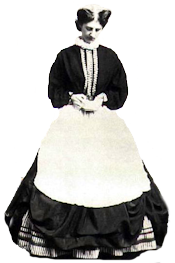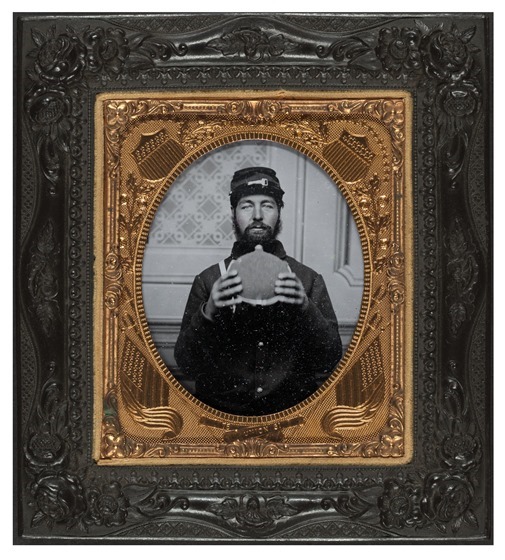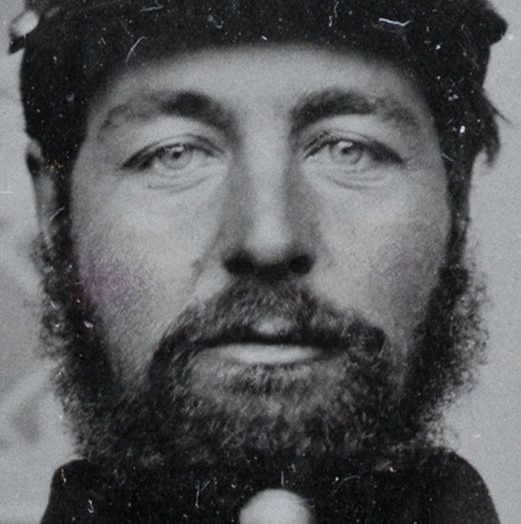Bridgeport, Monday, Dec. 7. Changed, washed, etc. in the forenoon. Wrote home in afternoon. All quiet in and around camp. Various rumors afloat as to our final destination for the winter. Generally supposed we are to open the road to Corinth. Fine weather for this time of the year.
Saturday, December 7, 2013
7th. Awakened by firing over Clinch Mountain. Sent back details and teams for rations. Clear beautiful day. Moved at 9 A. M. up the valley. About 3 P. M. arrived at Bunch’s Trail, a pass through Clinch Mountain. Rebel pickets here and drove them. Col. Acker dismounted 9th Mich. and dislodged them from the Gap. After dark fell back to same place started from in the morning. Very cold night, huddled down by fire with saddle blanket.
Monday, 7th—I was relieved from patrol this morning. Thus far we have not succeeded in locating any of the reported spies. This patrol duty is quite hard, since when we have a few moments for rest the only place is a vacant room over a store, without fire; furthermore, lying down on the floor is not very inviting because of the graybacks running over the floor.
December 7 — As we have very few tents, nearly the whole company was engaged in the peaceful avocation of building quarters to-day.
December 7.—I received a letter from my brother to-day. He is well, and has lost every thing except the clothes which he has on. I intend sending him some.
The weather is intensely cold, and our men must be suffering very much, for they are only half clad, and half shod. I often wonder how the enemy dare to taunt us about our rags and poverty. Are they really so blind to true principle as not to know that men who fight as ours do, and as they are kept, must have something high and holy to enable them to do it? There is more glory in their rags than all the glitter and gilt lace that the Federals have in their possession.
Our army is at Dalton, and I expect will remain there all winter. My brother blames the infantry for our defeat on Missionary Ridge; but I expect it is all for the best, and that we shall do better next time.
December 7.—The 4th New York Heavy Artillery has orders to move to Fort Ethan Allen, near Washington, and I have orders to return to Canandaigua. I have enjoyed the five weeks very much and as “the soldier” was on parole most of the time I have seen much of interest in the city. Uncle Edward says that he has lived here forty years but has never visited some of the places that we have seen, so he told me when I mentioned climbing to the top of Trinity steeple.
Caroline Carson Woolsey to Jane Stuart Woolsey at Fairfax Hospital.
General Meade’s Camp,
Near Brandy Sta., Dec. 7th, ’63.
Dear Jane . .—The train which left at 11 yesterday morning brought me through all right last night, by dark. A telegram from General Williams, sent to the conductor and meeting me on the train, said, in reply to one from me, that the ambulance would meet me at Brandy Station. The conductor had had some difficulty in finding me on the long train, but at the railroad bridge I heard “Woolsey” yelled at the door instead of “Rappahannock Station,”—which proved successful. I find that no movement of importance is on foot, and winter quarters somewhere (not here) confidently looked for this time. I hear a great deal said in justification of General Meade’s retrograde movement. The War Department is entirely responsible for the failure of the last campaign,—having ordered it, but not allowing General Meade to attack in his own way. We might have had a great battle and carried the rebel position with very great loss, but nothing but the position would have been gained. The rebels behind their strong works could have been very little damaged and would have had only to fall back, if we had assaulted.
We are camped in the woods near John M. Botts’ house, and are in this way shielded from the winds. There is no news.
Unidentified soldier in Union uniform with canteen
__________
Close-up crop:
__________
Sixth-plate ambrotype, hand-colored ; 12.3 x 11.1 cm (frame)
Liljenquist Family Collection of Civil War Photographs; Ambrotype/Tintype photograph filing series; Library of Congress Prints and Photographs Division.
Record page for image is here.
__________
 Note – This image has been digitally adjusted for one or more of the following:
Note – This image has been digitally adjusted for one or more of the following:
- fade correction,
- color, contrast, and/or saturation enhancement
- selected spot and/or scratch removal
- cropped for composition and/or to accentuate subject matter
- straighten image
Civil War Portrait 099
by John Beauchamp Jones
DECEMBER 7TH. —Cold and clear. Gen. Longstreet telegraphs to-day from Rutledge, Tenn., some fifty miles northeast of Knoxville, and says he will soon need railroad facilities. He is flying from superior numbers, and may be gathering up supplies.
Governor Vance writes distressfully concerning the scarcity of provisions in certain counties of North Carolina, and the rudeness of impressing agents.
Lieut.-Gen. Hardee telegraphs from Dalton that 5000 cavalry, besides two brigades of Buckner’s command, are with Longstreet, and that other troops ought to be sent him (H.) to compensate for these detachments.
Mr. L. S. White obtained another passport yesterday to go to Maryland, on the recommendation of Col. Gorgas, Chief of Ordnance.
There was a quorum in Congress to-day; but the message was not sent in.
A five-dollar gold piece sold at auction on Saturday for $140—$28 in Confederate notes for one of gold.
December 7.—Major-General Foster, from his headquarters at Tazewell, Tenn., sent the following to the National War Department: “Longstreet is on a full retreat up the valley. Your orders about following with cavalry, shall be carried out. My division of cavalry attacked the enemy’s cavalry in one of the passes of Clinch Mountains, yesterday P.M., and are pushing them vigorously. Couriers from Knoxville arrived last night. The road is clear. Sherman arrived here yesterday.”
—President Lincoln issued the following recommendation for prayer and thanksgiving, for the defeat of the rebels under General Longstreet: “Reliable information having been received that the insurgent force is retreating from East-Tennessee, under circumstances rendering it probable that the Union forces cannot hereafter be dislodged from that important position, and esteeming this to be of high national consequence, I recommend that all loyal people do, on receipt of this information, assemble at their places of worship, and render special homage and gratitude to Almighty God for this great advancement of the national cause.”—A debate on the question of the employment of substitutes in the Southern army was held in the rebel Congress.—The steamer Von Phul, on a trip from New-Orleans to St Louis, was fired into at a point about eight miles above Bayou Sara, and seriously damaged. — Major-General John A. Logan assumed command of the Fifteenth army corps, at Bridgeport, Ala.—The British steamer Ceres was captured off the port of Wilmington, North-Carolina.
—Full and enthusiastic meetings were held in various portions of Indiana. At the capital of the State, General Carrington made a strategical speech, illustrated by maps and diagrams, showing how the rebels could be circumvented.—Jefferson Davis sent a message to the rebel Congress, which was received and read in both houses.—(Doc. 21.)












